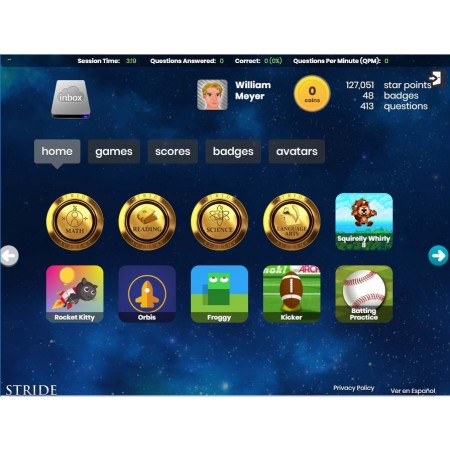x
Search results for 'physical science'
Show Filter
Summit Physical Science, Semester 2 (SCI08B)
The Physical Science program introduces students to many aspects of the physical world, focusing first on chemistry and then on physics. The course provides an overview of the physical world and gives students tools and concepts to think clearly about matter, atoms, molecules, chemical reactions, motion, force, momentum, work and machines, energy, waves, electricity, light, and other aspects of chemistry and physics. Among other subjects, students study the structure of atoms; the elements and the Periodic Table; chemical reactions; forces, including gravitational, motion, acceleration, and mass; and energy, including light, thermal, electricity, and magnetism. This is the second semester of a two semester course.$450.00
Summit Physical Science, Semester 1 (SCI08A)
The Physical Science program introduces students to many aspects of the physical world, focusing first on chemistry and then on physics. The course provides an overview of the physical world and gives students tools and concepts to think clearly about matter, atoms, molecules, chemical reactions, motion, force, momentum, work and machines, energy, waves, electricity, light, and other aspects of chemistry and physics. Among other subjects, students study the structure of atoms; the elements and the Periodic Table; chemical reactions; forces, including gravitational, motion, acceleration, and mass; and energy, including light, thermal, electricity, and magnetism.$450.00
Science 5 E1
Science 5 brings science alive by providing students a combination of virtual lab investigations (with options for hand-on learning), interactive lessons, and an array of e-books that capture students’ attention and grow their interest in science. Students engage in science and engineering practices as they explore topics such as matter, organisms, ecosystems, the earth’s systems, and the earth’s place in the universe. Throughout the course, students conduct investigations using digital tools and simulations. Some labs also include alternative investigations that use household materials.
This course calls for the following household materials, though they are optional, since digital versions of all labs are available:
- Science Notebook (required)
- pencil or pen (required)
- 4 tablespoons salt (optional)
- 2 tablespoons baking soda (optional)
- 2 tablespoons flour (optional)
- water (optional)
- spoon (optional)
- 6 plastic cups (optional)
- 1/4 cup (optional)
- 1 tablespoon (optional)
- vinegar (optional)
- marker or pen (optional)
- 1-2 ice cubes (optional)
- black paper (optional)
- 1 tablespoon powdered drink mix or sugar (optional)
- butter knife (optional)
- 2 shallow bowls (optional)
- 1 package celery stalk, lettuce or bok choy
- 1 cup soil (optional)
- 5-6 drops food coloring (optional)
- 3 plastic plates (optional)
- 1 balloon (optional)
- 1 tablespoon black pepper (optional)
- notebook paper (optional)
*Students may also keep a digital Science Notebook.
From: $900.00
Science 4 E1
Science 4 E1 brings science alive by providing students a combination of virtual lab investigations (with options for hands-on learning), interactive lessons, and an array of e-books that capture students’ attention and grow their interest in science. Students engage in science and engineering practices as they explore topics such as weather, climate, earth’s place in the universe, organisms, ecosystems, waves, information transfer, motion, and forces. Throughout the course, students conduct investigations using digital tools and simulations. Some labs also include alternative investigations that use household materials.
This course calls for the following household materials, though they are optional, since digital versions of most labs are available. Other times, students will design their own investigation and choose their own household materials:
· Science Notebook (required)*
· pencil or pen (required)
· crayons or markers (optional)
· notebook paper (optional)
· pot (optional)
· pot holders (optional)
· ice cubes (optional)
· stove (optional)
· string or twine (optional)
· instrument, string (optional)
· water (optional)
· large plastic tub or bathroom sink (optional)
· plastic object or toy that floats, like a rubber ducky
· 1 rock or stone (1inch in size) (optional)
· 1 rock or stone (2 inches in size) (optional)
· 1 rock or stone (3 inches in size) (optional)
· large plastic tubs or containers (optional)
· clear glass (optional)
· plastic cup (optional)
· flashlight (optional)
· piece of wood or wooden surface (optional)
· mirror (optional)
· prism (optional)
· tap water (optional)
· magnifying glasses (optional)
· drinking glasses (optional)
· can, aluminum (optional)
· hand drum or appropriate substitute (optional)
· tape (optional)
· coin (optional)
· scissors (optional)
· stopwatch (optional)
· meterstick (optional)
· ball (optional)
· bat, or other long-handled implement (optional)
*Students may also keep a digital Science Notebook.
From: $900.00
Science 3 E1
Science 3 brings science alive by providing students a combination of virtual lab investigations (with options for hand-on learning), interactive lessons, and an array of e-books that capture students’ attention and grow their interest in science. Students engage in science and engineering practices as they explore topics such as organisms, the environment, weather, climate, motion, and forces. Throughout the course, students conduct investigations using digital tools and simulations. Some labs also include alternative investigations that use household materials.From: $900.00
Science 2 E1
Science 2 brings science alive by providing students with a combination of virtual lab investigations (with options for hands-on learning), interactive lessons, and an array of e-books that capture students’ attention and grow their interest in science. Students engage in science and engineering practices as they explore topics such as matter and its interactions, changes to the earth, and plants and animals. Throughout the course, students conduct investigations using digital tools and simulations. Some labs also include alternative investigations that use household materials.
This course calls for the following household materials, though they are optional, since digital versions of all labs are available:
- Science Notebook (required)
- pencil or pen (required)
- 3 plastic cups or jars (optional)
- water (optional)
- marker or pen (optional)
- tablespoon (optional)
- notebook paper (optional)
- 1/2 cup cornmeal or flour (optional)
*Students may also keep a digital Science Notebook.
From: $900.00
Science 1 E1
Science 1 brings science alive by providing students a combination of virtual lab investigations (with options for hand-on learning), interactive lessons that provide opportunities for inquiry, and an array of e-books that capture students’ attention and grow their interest in science.
The curriculum begins with an overview of what science is and how to study it. Students then focus on plant and animal traits and relationships. In the last half of the course, students explore the patterns they see in the sky and examine how sounds and light are used to communicate and help them understand their world.
This course calls for the following household materials, though they are optional, since digital versions of all labs are available:
- cardboard box, large
- coin
- composition book, notebook, or loose-leaf paper to use as a Science Notebook*
- crayons, markers, or colored pencils
- flashlight
- number cube
- paper clip
- pen cap
- scissors, round-end safety
*Students may choose to keep a digital Science Notebook.
From: $900.00
Science K E1
Science K brings science alive by providing students a combination of virtual lab investigations (with options for hands-on learning), interactive lessons that provide opportunities for inquiry, and an array of e-books that capture students’ attention and grow their interest in science.
The curriculum begins with an overview of what science is and who scientists are. Students then focus on plant and animal relationships and analyze the weather. In the last half of the course, students explore how the sun affects their world and explore the interactions between different forces.
This course calls for the following household materials, though they are optional, since digital versions of all labs are available:
- blanket
- composition book, notebook, or loose-leaf paper to use as a Science Notebook*
- crayons, markers, or colored pencils
- hat
- scissors
- toy car
- umbrella
*Students may choose to keep a digital Science Notebook.
From: $900.00
Summit Science K (Independent Study)
Kindergarten students begin to develop observation skills as they learn about the five senses, the earth’s composition, and the basic needs of plants and animals.From: $24.00
Stride Skills Arcade
Stride Adaptive Learning Software for Grades Pre-K through 8
Stride™ is an adaptive learning solution for your children that quickly accelerates learning with engaging curriculum engineered to match the depth and rigor of higher learning standards.
Questions? Call 888-222-8126
From: $9.95
Summit Life Science, Semester 2 (SCI07B)
The life science curriculum invites students to investigate the world of living things—at levels both large and small—by reading, observing, and experimenting with aspects of life on Earth. Students explore an amazing variety of organisms, the complex workings of the cell, the relationship between living things and their environments, and discoveries in the world of modern genetics. Practical, hands-on lesson activities help students discover how scientists investigate the living world. Students perform laboratory activities and a full-unit investigation to learn about the application of scientific methods.>$450.00
Summit Life Science, Semester 1 (SCI07A)
The life science curriculum invites students to investigate the world of living things—at levels both large and small—by reading, observing, and experimenting with aspects of life on Earth. Students explore an amazing variety of organisms, the complex workings of the cell, the relationship between living things and their environments, and discoveries in the world of modern genetics. Practical, hands-on lesson activities help students discover how scientists investigate the living world. Students perform laboratory activities and a full-unit investigation to learn about the application of scientific methods.$450.00
NEED MORE INFO

THANK YOU!
We have received your inquiry and you will start to receive additional information about our school offerings and programs. An enrollment consultant will contact you shortly.

